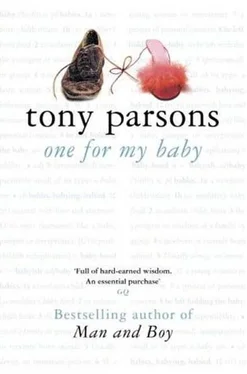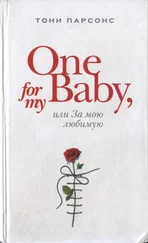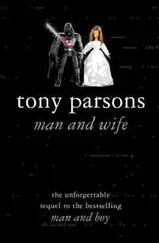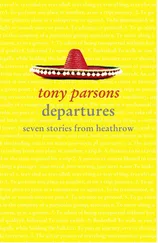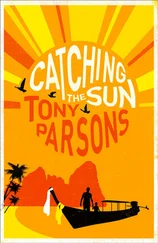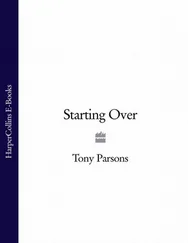My grandmother’s memories. Nobody else’s.
It’s too soon to think about Oxfam, too soon to think about throwing anything away. Some other day, perhaps.
For now, I choose one thing to remind me of my nan. It sums her up for me.
It is a bottle of lurid red nail polish called Temptation. On the bottle there is an admonition, a piece of advice, a philosophy. Nail him, it says. I think of my nan painting on her Temptation nail polish well into her eighties, and I smile for the first time all day.
Lovely. She was lovely.
Despite the unknown faces, my father seems haunted by the photographs. And there are many. Albums featuring cartoons of seventies’ platform-booted babes on the cover. Shoe boxes full of fading color pictures. Photo books with sleepy English fishing villages on the cover and black-and-white pictures from the forties and fifties inside. Ancient black-and-white photographs, yellow with age, behind heavy slabs of glass, and what seems like chain mail on the back for hanging them up. Countless photos still in the envelopes they were in when they came back from the drugstore.
All those weddings, Bank Holidays, Christmases, birthdays, Sunday afternoons. All those lives.
My father finds a scrapbook. It’s a scrapbook about him and his career, his success. It begins with his early stories as a young sportswriter and goes all the way up to Oranges for Christmas, when he became the story.
My father looks touched, humbled. No, he looks lost. It is clear he never knew this scrapbook existed, never knew that his mother was so proud of him. He seems-I don’t know what it is. Ashamed, perhaps. Or alone. Yes, that’s it. My father seems alone.
And I can see that you are never truly alone in this world until both of your parents are dead.
W HEN I GET BACK from my grandmother’s cremation, there’s a message from Jackie on my mobile, telling me to call her urgently. It’s examination day. For my students at Churchill’s and for Jackie too. She sounds excited, and I guess it means that she feels a step closer to all of her dreams coming true.
But I am wrong.
“Alfie?”
“You okay? Ready for the exam?”
“I’m not going to take the exam.”
“What? Why not?”
“It’s Plum.”
“What’s wrong with her?”
“She’s run away from home.”
The examination hall for A Level English is in a college near King’s Cross.
The place is full of students-nervous students, confident students, students who have already abandoned all hope. And there’s Jackie, older than the rest, frightened for different reasons, for grown-up reasons that have nothing to do with getting qualifications or getting ahead, dressed far too formally for someone who is scheduled to take an A Level this afternoon, waiting for me outside the examination room.
Her paper starts at three. She has just under five minutes. But she is not even thinking about that.
“The school called me. They wanted to know where she was. Then I found the message from her on my mobile. She said she had to get away. She’s gone, Alfie.”
“What about her dad? Friends?”
“She’s not with her dad. And there are no friends. Not now your nan’s gone.”
“I’ll find her, okay?” I look up at the clock. It’s nearly three. “You have to go inside now. You really do. If you don’t, you lose your chance.”
“How can I? How can I think about all of that stupid stuff when my daughter’s missing?”
“She’ll be back. You can’t throw it all away.”
“I don’t care about any of that. The degree, Carson McCullers, poems by sad old men who wouldn’t know love if it took a chunk out of their codpiece. This is all my fault. I don’t know what I’ve been thinking about. I don’t know what I’ve been doing with you. Studying emotions in a dramatic extract and all the rest of that old…what a pathetic waste of time. I should have been thinking about my girl.”
“You do think about your girl. You think about her all the time.”
“What’s wrong with the life we’ve got? What’s wrong with it? That’s what I’d like to know.”
“Stop it, will you? Talking like that doesn’t help her and it doesn’t help you. Go on. Get in there and do your best. I’ll find her. She’ll be fine. I promise.”
“I just want my girl back.”
“You’ll get her back. Just get in there.”
She puts her hands on her hips. “Is there a dog in here? Who do you think you are? Who do you think you’re talking to? You’re not my husband.”
“Go on, Jackie.”
She stares at me as if this is somehow all my fault. Me and my books and my cynical friends. Her eyes are shining and her bottom lip is clenched to stop it trembling. But she starts drifting toward the examination room with all the other students, still watching me with a kind of weepy hostility until the door closes behind her.
Then I walk out into the city, looking for Plum, still dressed for a funeral.
I go to Leicester Square, the gaudy, rancid heart of the West End, and wander around looking at the faces of the children huddling in doorways, hanging out in the park, squatting on the street. Plum’s not there.
So I walk down Charing Cross Road to the Strand, for some reason a favorite area for homeless kids, and cover its length from the railway station to the Savoy. Lots of teenagers with their sleeping bags in doorways. But no Plum.
I head north, up into Covent Garden. Plenty of young kids on the street, but for some reason only a few obviously homeless, dragging their sleeping bags across the piazza, ignoring the jugglers and the streetbands and the mime artists who wow the tourists and make everybody else feel like slitting their wrists. And I stare at some dopey git whose big selling point is that he doesn’t move, he never moves an inch, and I realize that Plum could be anywhere. She doesn’t even have to be in London.
My mobile rings. It’s Jackie. I tell her there’s no news, please don’t worry, go back to Bansted and wait for my call.
She wants to help me look for Plum but I persuade her that one of us should be at home, waiting by the phone, in case there’s a call. Reluctantly, she agrees.
Naturally-at least it seems natural to me-I want to know how the exam went. Jackie refuses to talk about it. She gets angry when I press her for information, acting as if all that side of her life-wanting to go back to college, caring about books, wanting a degree, thinking about poems and plays and The Heart Is a Lonely Hunter as though they were the most important things in the world-is the root of all her problems.
As though you can be punished for your dreams.
When the sun goes down, the city changes.
The office workers go home and the party people pour into the streets of Soho, Covent Garden, Oxford Street. And I can’t imagine Plum here, among the designer coffee and the loud laughter and the empty chatter. It’s not her.
So I go to the stations, starting off in the east at Liverpool Street, where the trains from Bansted come in, and gradually move across town. London Bridge, King’s Cross, Euston. All the big mainline stations. Then out west. Paddington, Victoria. There are pitiful little groups of children with their backpacks and their sleeping bags in every nook and cranny of these giant stations, but I can’t tell who is homeless and who is waiting to go home. Later, nearing midnight, it becomes more obvious. The ones who are going home watch the notice board for departures, the ones who are not going home stare at nothing, or warily watch the men in the shadows who eye them up, waiting to make their move. But there is no sign of Plum at the stations.
I am about to call Jackie when I realize that I have missed Saint Pancras, that Victorian Christmas cake of a station next to Euston.
Читать дальше
